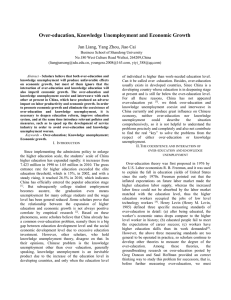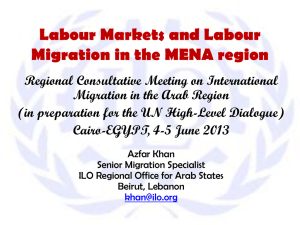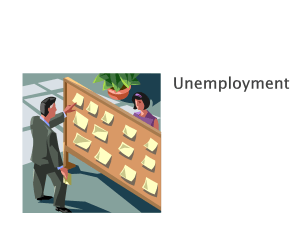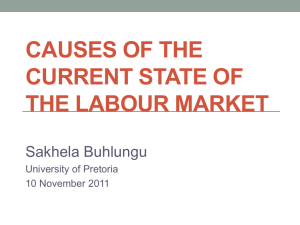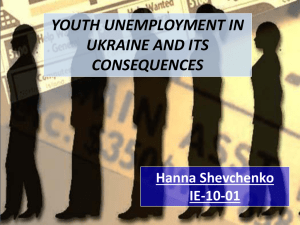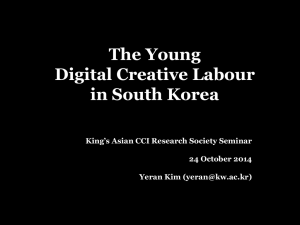Božidar Šišević
advertisement
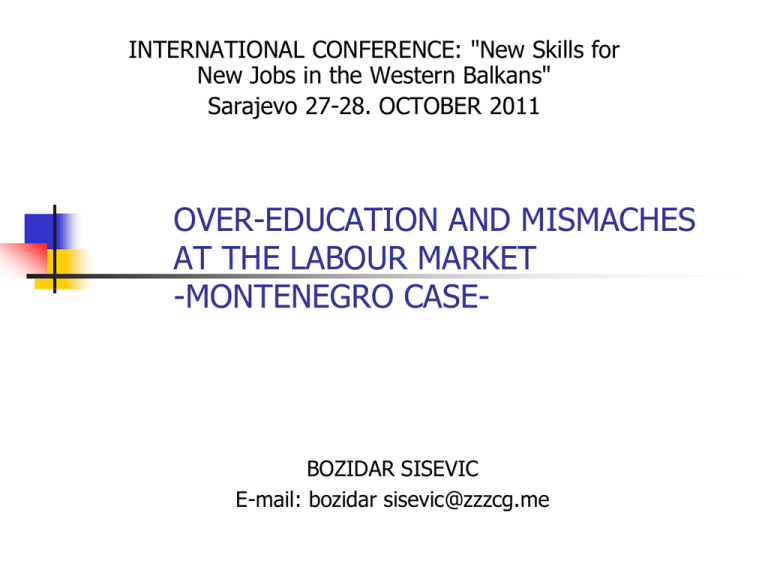
INTERNATIONAL CONFERENCE: "New Skills for New Jobs in the Western Balkans" Sarajevo 27-28. OCTOBER 2011 OVER-EDUCATION AND MISMACHES AT THE LABOUR MARKET -MONTENEGRO CASE- BOZIDAR SISEVIC E-mail: bozidar sisevic@zzzcg.me Main aims of presentation Up to know, in forme socialist counties, now transitional countries, concept of over-education is still new. Due to, the main goal of this paper/presentation is to: To introduce and theow some lits on the concept in theory of industrialised countries To show specific nature of this problem in montenegro To ilustrate extent and different forms of the over-education and mismaches in montenegro To analize couses and conseguences To rise avarenes of the problem To propose this issu for further research in the DEFINITION and NATURE OF OVER-EDUCATION in Industrialised countries - Short Historical Overwue A. SHORT HISTORICAL OVERVIWS 1. CONCEPT OF OVEREDUCATION IN economic literature dates from the begining of 1970s[1] (when M. Spence challenged the classical human capital theory (by Gary Becker). 2. IN THE MEAN TIME QUITE A LOT OF RESEARCH HAS BEEN DONE and a different theroies have been developed 3. UP TO RECAINT TIME A HUMAN CAPITAL THEORY (HCT) DOMINATED (ECONOMIC LITERATURE ) 4. RENUVAL OF INTREST FOR THE ISSUE OF OVEREDUCATION. Recent educational expansion in many countries and the job crises has renewed interest in over-education. The educational system has often been highlighted as the main source of over-education, whereas the role of the labour market has been neglected. [1] Spencer, Michael (1973). Job Market Signaling. The Quortaly Journal of Economics 87 (3) DEFINITION and NATURE OF OVER-EDUCATION in Industrialised countries - Short Historical Overwue B. Definition: There ara meny definitions of overeducation. Most coman reads: Over-education occurs when investment in human capital is being excessive for the job currently carried out by the individual. 4 DEFINITION and NATURE OF OVER-EDUCATION in Industrialised countries - Short Historical Overwue C. PROBLEM OF MEASURING OVER-EDUCATION/MISMACHES Measuring OVER-EDUCATIO OR ‘underutilisation of education’ is a rather difficult task and most of the approaches do not deliver satisfactory results. TWO TIPS OF DEFFINITIONS AND MEASURING HAVE BEEN APPLIED IN THER RESEARCH – SUBJECTIVE AND OBJECTIVE SUBJECTIVE MEASURES rely on what individuals report themselves on the utilisation of skills. (According to The 2005 European Survey on Working Conditions 52.3% of workers declare that ‘their duties correspond well to their present skills’; 13% ‘need further training to cope well with their duties’; 34.6% estimate that they ‘have the skills to cope with more demanding duties’) MORE OBJECTIVE measures usually compare the years of schooling attained by a worker with the average level of schooling within the worker’s occupation. OTHERS look at the educational level of the worker and compare this to the requirements of a specific job. DEFINITION and NATURE OF OVER-EDUCATION in Industrialised countries - Short Historical Overwue D. TIPES OF OVER-EDUCATION/MISMACHES: FORMAL OVER-EDUCATION (is occuring when real knowledge and competences of the worker at the certain job only formaly excedes real job requrements), REAL OVER-EDUCATION (is occuring when real knowledge and competences do excede coinside with what is expected from certain diploma and job requrements), QUNTITAVE OVER-EDUCATION IMBALACES (occures when the number of individuls with certain education excedes the nomber of available jobs at the labour market) QULITATIVE OVER-EDUCATION (occure when there is a differences between the skills a worker provides and the skill necessary for the job). DEFINITION and NATURE OF OVER-EDUCATION in Industrialised countries - Short Historical Overwue E. (NEGATIVE) CONSEQUENCES OF THE OVEREDUCATION/MISMACH wage differential (overeducated earn less then thouse who fit completely) job sutisfaction (overeducated are less sutisfied with a job) Transitional Countries – Former socialist countries of West Balcan 1.Concept of over-education in these countires is still new and not well undestud (there was little research if any) 2. Humana capital theroy (HCT) concept prevailed in forme socialis countries, and, actualy, HCT has never been unchalanged up know, 3. During socialist time, there ware meny instances of over-education similar to those in industrialized countries but there was little interes of researches and oficials 4. Recaint rise of interest.With a recaint explosion of higher education and increas of unemployment of higly educated will influance interest of researches and policymakers for this issue. The main aim and of this paper/presentation is to indicate that recant explosion of high education i.e.. Mass education in a small lees developed traditional and transitional country like Montenegro can lead to big mismatches at the labour market, underutilisation of the work force and high unemployment of the most educated Actualy, we are tolking obut new phenomena in these countries. OVER-EDUCATION AND QULITY OF EDUCATION – SHORT DESCRIPTION OF THE EGZISTING SITUATION Over- education or mass education is a very new phenomena (less the 10 years) and it is beginning to produce negative consequences In the last 5-6 years college and university enrolment is very high (around 90% of the those who completed secondary education enrol at college or university Quite substantial number of employees enrol at colleges and universities to get diploma of higher education (job promotion, job security, higher salaries) a lot of people are in the pipeline due to long studding time (around 6 years) and high drop autos (around 6o% enrolled does not complete high education) Quite big increase of the number of unemployed and increase of share in total unemployment Productivity and competitiveness of the national economy does not increase regardless of substantial increase of education of the employed and of the population in general Contribution of education to the GDP (very low – around 5% in us over 60%) and does not increase over time although average level of education of the population and employees increased substantially[1]. Entrepreneurs and other employers are no satisfaction with the quality of the workforce employees (3 studies[2] show quit a big Un satisfaction (around 50%) with the quality of employees who comes from the educational system. Both - essential-hard core skills for occupation and soft skills). Students un sutisfaction with conditions and facilities for studding and with quality of education has been growing Pisa results: Montenegro students show pure performance at these tests (around 45 place at the scale of 55 counties); Montenegro (state) university was low at the scale of bologna process implementation ranking (in particular on the issue of quality control). I. DISCREPANCES/MISMACHES IN THE SECONDARY EDUCATION – HORIZONTAL MISMACHES AT THE III LEVEL OF VET EDUCATION Odnos gimnazija VET Horizontal mismatch - between demand and supply for certain sectors and occupations at the iii level of education: Thourism (cooks, waters, meat caters, fast food preparation) Construction and home building (practicaly all ocupations) Agriculture, especialy private sektor of agriculture (young selfemplyed farmers ) Certain crafts (personal services – electritations, home appliance repairs, home electronics devices, carpanters, bricklayers, car maintiance and repairs) Production workers in certain industries and certain jobs (metalurgy, mining, some processing industries) Notice: These shortages are not so evident in the official statistics at national level regarding demand and supply of these occupations. Nominal supply is much biger then the real supply – real availability of the people for employment I. DISCREPANCES/MISMACHES IN THE SECONDARY EDUCATION – HORIZONTAL MISMACHES AT THE III LEVEL OF VET EDUCATION Main reasons for mismaches: Big diskrepance/mismach between supply/ enrolement And actual demand on the market, lack of knowledge, work experiance and competencies and reluctance of entreprenurs to hiring and employ this people, Upvords movement/ progression from the iii to the iv level of education, Regional diskrepances/mismaches ( most of the supply in the underdeveloped region and most of the demand in the central and costal area. Budva, herceg novi, podg.) Unfer competition - entrepeneurs prefer to hiher »imported« workforce (better trained, less costly, less dimanding working conditions...) Shortages have been overcome by importing workforce from the region (yearly import of work force has been officialy in the range of 20 000 to 60 000; real import is qute higher) DISCREPANCIES AT THE III LEVEL 25000 Total III level 2481 Total IV level 19946 Total 22427 22427 19946 20000 15000 10000 5000 2481 0 Total III level Total IV level Total DISCREPANCIES AT THE III LEVEL 6000 5185 5019 4991 5000 4152 4000 2942 2837 3000 2542 2542 2046 2011 2000 1672 ‚‚‚‚‚‚ 1033 987 1000 912 795 685 384 35 0 117117 105 28 861888 384 0 71 71 0 0 269286 191191117 17 50 48 98 27 0 74 74 0 Transport Foresty Mecaniks Electotechnic Trade, Economisc,Personal Tectile and wood and metal tourism low and services and skin prosessingprocessin and administration catering UKUPNO IV III IV UKUPNO III IV UKUPNO III IV UKUPNO III UKUPNO IV III UKUPNO IV III UKUPNO IV III UKUPNO IV III UKUPNO IV III UKUPNO IV III IV UKUPNO III IV UKUPNO III IV UKUPNO III UKUPNO IV III UKUPNO IV III 0 Musics Arhitecture,Chemistry, Geology, Agriculture,Medicine Fine arts geodesy nonmetals mining food and and and and production designe construction printing metallurgy and food processing Changes at the labour market in 2000, 2005, 2010 40% 35% Uunemployment 38% Eemployment 40% 31% 30% 30% 26% 27% 29% 29% 35% 32% 31% 32% 2000 25% 20% 2005 20% 2010 15% 16% 15% 10% 5% 7% 5% 31% 28% 28% 30% 25% 34% 23% 25% 23% 21% 20% 18% 17% 10% 0% I + II III + V IV VI+ VII1+ VII2+ VIII 2005 2010 5% 0% 2000 I +II III+V IV VI+VII1+VII2+VIII I. DISCREPANCES/MISMACHES AT THE HIGHER EDUCATION CONCLUSION and WAY FOREWARD Recant over education us a consequence of mass education has started to produce several negative consequences: limited knowledge and competences, Low contribution to increase productivity It contributes to increase in job unsutisfaction It does not employment (opposite it can be a course of unemployment and it can contribute to high unemployment) It leads to high unemployment of the most educated – even to long term unemployment It contributes to the shortage of the labour force at the lover level of education (in particular at some occupations at the iii level If decisive measures are not taken in very recant time, negative consequences will increase leading to waste of time and money for substantial numbers of individuals, their families and whole society we can talk hear about typical case of lost generations) The situation in the education and labour market, i expressed in these slogans: The issue of over education in the (west Balkan) region deserves and requires much more attention from all agents: - first of all researches to document much better its courses and (negative) consequences, government (state and local policy makers), entrepreneurs educators, parents students
